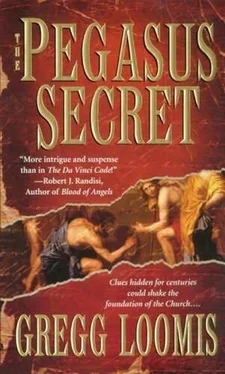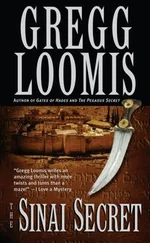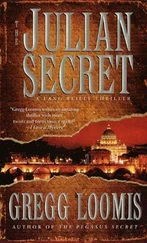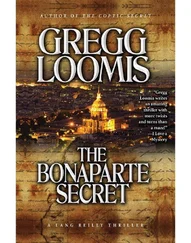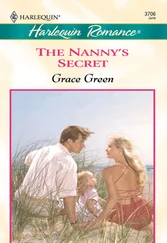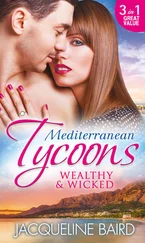As they advanced, Guillaume de Poitiers turned his white charger and trotted back to us so serenely as to deny he was about to enter the arena of battle. 8From the impedimenta upon the back on one of the tethered horses trailing behind Philippe and myself, he drew his great sword and lifted his shield. Holding the blade in one hand and the shield in the other, he turned his horse and spurred it towards those who meant us harm.
"God's will be done!" he shouted as he thundered down the narrow path.
A knight on horseback is more than a match for men on foot armed only with clubs and short knives, as I was about to witness.
The men in the road apprehended their fate and began to scatter, condemned by their choice of location. There was no means for them to escape other than down the road or over the precipitous edge to near-certain destruction.
Our knight stood in the stirrups and swung that mighty blade, cleaving one man's head and shoulders from a body that ran one Dr two more steps before falling in a sea of his own blood. The next man shared his companion's fate. Two more jumped into the abyss rather than being skewered like swine above a fire.
Although I had seen men· die of the fever or simply because God had willed it, I had,never witnessed souls depart this life with so much blood. Even though these men had meant us evil, I was distressed there was no priest available to administer a final unction. I said a speedy prayer for these robbers in hopes of preventing eternal torture of their souls, a revenge no Christian could desire even for those as foul as these. We are, after all, brothers in that we are children of the Lord of Heaven.
If Guillaume de Poitiers harbored such thoughts, he did not reveal them. Instead, he stood in the stirrups again, signaling us to move forward with his sword.
"Are you well, m'lord?" Phillipe asked his master as soon as we had drawn near enough to be heard.
The knight gave us that laugh as he handed his bloody sword, hilt first, to Phillipe. "Praise God, as well as a man can be who has just sent scoundrels to their proper place in hell. We must hasten to find the rest, for surely their encampment is nearby."
I am ignorant as to how he knew this to be so but it was not my station to question the judgement of a knight of God. And as the land became flat, we smelled smoke. A trace of it could be seen against the sky, now brilliant with morning's full light. At the edge of the road, he bade us be quiet, took a fresh mount and led us into a forest so thick it was as if twilight had come.
Shortly we came a clearing. A few mean twig huts were gathered around a central fire over which a hind was roasting, poached from the local lord. These varlets ate far better that those in the service of God.
About the fire were a number of women, some suckling infants. The only men to be seen were old or visibly disabled, no doubt from a life of knavery. Upon seeing our knight, those that could scattered like a covey of partridge. The balance retreated into the crude shelters.
Guillaume de Poitiers disdained following those who had fled. Instead, he leaned from his great warhorse, taking a burning faggot from the fire with which he lit the hovels. As we left, I could hear the screams of those trapped with the conflagration.
"Sir," I asked, "I can understand your putting to flight those who would have robbed us, but is it not unchristian to put to the torch those who have done us no evil?"
He inclined his head as he stroked his beard before replying. "Those who would have robbed us are succored by those we have destroyed. They are but vile creatures, serfs illegally escaped their master who intend to live a life causing mischief to travelers such as we. Their destruction is no more than the killing of vermin in the grain house."
This did not comport with my understanding of the teachings of Our Lord that even the lowest among us are as brothers. But I was young, ignorant and in the company of a man who had fought and bled for Christ, so I changed the direction of my query.
"But sir, you did not look into the eyes of those you killed here," I said, remembering the remark he had made about his wound. "They died in their huts, baking like so much bread."
He nodded, that smile on his lips. "You remember well, little brother. But there are exceptions to every rule. Those men in their shelters died of fire, one of God's four elements."
I knew the four elements consisted of fire, water, wind and earth, but I knew not what pertinence this had to killing. I indulged myself in the sin of pride. I was ashamed to admit I knew not.
Within a few hours we entered the city of Trapani, the name meaning "sickle" in Greek because of the crescent shape of the harbor there. As I have said, until this time I had never been more than a day's journey by foot from my home. I had, of course, heard of the sea, but that is different from seeing it. Thinking of those waters like those on which Our Lord walked and in which His apostles fished, I had not imagined anything like what greeted us. I am ashamed to admit my faith was so little that I could not have imagined the fashioning of anything so deeply blue, so restless or so vast. I had been used to seeing hills and mountains, trees and streams. But here I could see to the very edge of the earth.
Nor had I seen ships before, huge carts that floated upon the water with great white sails, each vessel with enough cloth to blanket the abbey I had left. There seemed to be thousands of these craft, crowding each other as they rose and fell with each breath of the mighty ocean. 9This huge fleet, I was told, belonged entirely to the Templars who, after paying what amounted to extortion to the Venetians to leave the Holy Land, had decided to purchase their own ships. 10Those members who had not already done so had gathered here to journey to their home temples.
For days we waited for a wind that would take us northward along the coast of Italy to Genoa and then to the coast of Burgundy. But even the size of these craft to the vastness of the sea, even my faith did not prevent me from becoming trepidant. This I recognized as my weakness, my failing, that I was unable to be comforted that God's will would be done.
During the time in Trapani, I came to realize Guillaume de Poitiers was not alone different from the poor monks with whom I had lived. All his Templar brethren lived well. Although it is hardly man's place in God's scheme to judge, I noted humility and poverty did not number among their attributes. They enjoyed great quantities of unwatered wine (which they were quick to condemn as inferior to the wines of other regions) and were profligate in their habits. Gaming was as common among them as prayer as was recounting stories in which the narrator was the hero, usually a little bit more so than his predecessor.
I was to learn a number of the Holy See's rules did not apply to this Order. This may well have carried the seeds of its fall from grace, a fall as disastrous if less spectacular than Satan's from Heaven.
Translator's Notes
1. Armour shielding leg and foot
2. Armour covering the arms, shoulders and upper body
3. A device for throwing large rocks, like a catapult
4. The Italian equivalent of William is Guglielmo
5. 1091-1250
6. Approximately 650 meters
7. The word Pietro uses is cycgel, Frankish for either a short heavy club or a weapon used to beat upon an opponent. In this context, it is doubtful these people would have weapons more sophisticated than could be fashioned from readily available material.
8. The author uses liste, a Frankish word which later came to include the areas used for knightly competition. Since the sport of jousting between knights was unknown at the time of Pietro's narrative, the earlier meaning of the word is used.
Читать дальше
